47 police officers, 26 protesters, 9 passersby and one firefighter treated by MDA; Erdan: No repeat of Tuesday’s violence; roads across country to be blocked from 3:30 p.m.
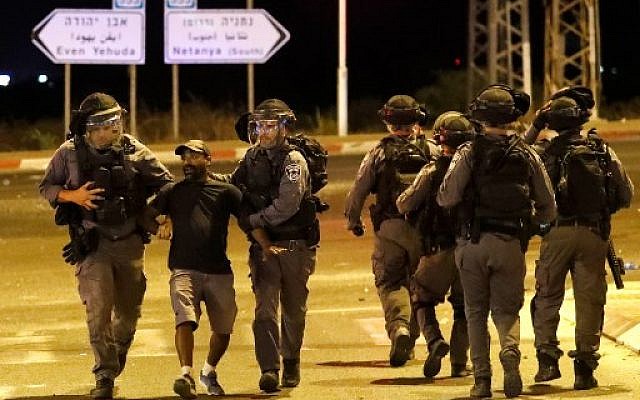
Police said Wednesday that 136 people had been arrested since the start of demonstrations over the shooting of an Ethiopian Israeli teen by a policeman on Sunday.
Those arrested were held on suspicion of attacking police officers, vandalism and disturbing public order.
Police said that they acted with restraint for the first few hours of Tuesday’s demonstration and allowed freedom of protest, but will “act vigorously to stop the violence using all the means at our disposal.”
The protests turned violent Tuesday in the wake of the funeral of 19-year-old Soloman Tekah on Tuesday. The Magen David Adom emergency medical service said it treated 83 people — 47 police officers, 26 protesters, 9 passersby and one firefighter.
Police said 111 officers had been injured in all.
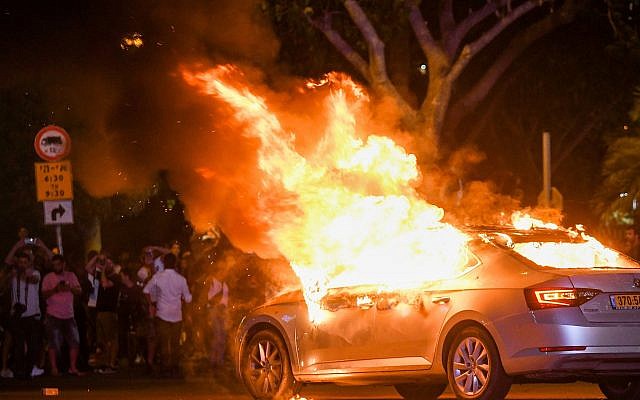
Public Security Minister Gilad Erdan said Wednesday morning that the violence seen around the country the previous day would not be allowed to continue. He added that he understands “the great sorrow and suffering that tens of thousands of people have suffered, but the police must gradually act.”
“The police have taken the necessary steps and gradually built up their strength and ability to cope with such a protest, but today if we see such a level of violence, the police will have no choice but to use all means to disperse demonstrations,” he said.
Activist leaders have called for protesters to gather Wednesday at 3:30 p.m. at the following locations: Kiryat Ata interchange; Yokneam interchange; Independence Square in Afula; Poleg interchange; Azrielli interchange in Tel Aviv; Rosh Ha’Ayin police station; Route 4 in the region of Rishon LeZion and Yavne; the western entrance to Jerusalem; city entrances and exits on Route 431, the El Al interchange close to Ramle and Lod; the Bilu interchange; Kastina interchange; Ashkelon arena interchange; and Beersheba Central Bus Station.
Erdan also told Army Radio that there was concern for the safety of law enforcement at Tuesday’s protests, as intelligence suggested there was a possibility demonstrators could “firing live ammunition at police officers.”
Earlier in the morning, he vowed to prevent “anarchy” after police put an end to day-long protests that blocked key intersections across the country for hours.
Speaking after meeting police chiefs to take stock of the situation shortly after midnight, Erdan said he supported the right to protest but would not tolerate violence and “anarchy.”
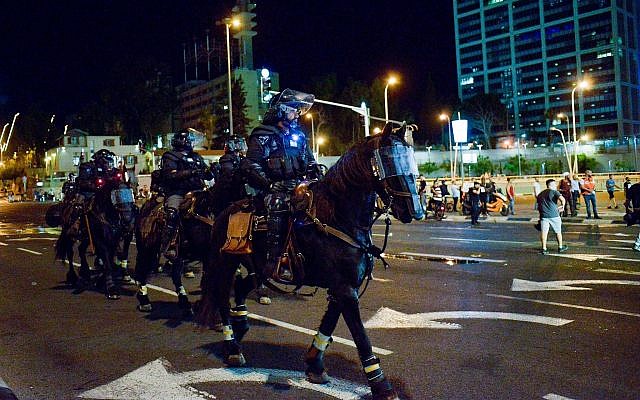
“The Israel Police made every effort and did everything possible to allow the protesters to express their pain and put out their message,” said Erdan. “Forces acted with restraint and tried to avoid violent clashes that would lead to further bloodshed.
“We will continue to protect the rights of protesters to demonstrate, but we will not tolerate anarchy and we will not tolerate serious disruptions to public life,” he said, adding that police would also work to “prevent harm to people or serious destruction of property.”
Tekah, the slain Ethiopian teen, was shot dead by an off-duty police officer during an altercation in the Kiryat Haim neighborhood of Haifa on Sunday. An eyewitness to the shooting has reportedly told the Justice Ministry’s Police Internal Investigations Department that, contrary to the officer’s claims, he did not appear to have been in danger when he opened fire.
While protests Monday against the police were primarily attended by Ethiopian-Israeli demonstrators, Tuesday saw a mobilization of members of the general Israeli public, who joined the chants against police brutality toward the minority community.
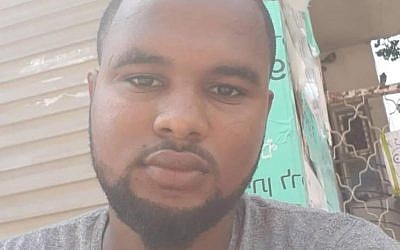
The officer who shot Tekah was arrested on suspicion of unlawful killing, the PIID said Monday. The Haifa Magistrate’s Court later released him to house arrest, sparking further rage in the community. He is reportedly under heavy guard due to fears for his safety.
According to Channel 12 news, the officer claims he aimed downwards, and a bullet ricocheted from the ground, hitting Tekah. The officer claimed he was trying to break up a street fight he came across, but was set upon by three youths who hurled stones at him, endangering his life.
The PIID issued a rare statement on Tuesday, saying it had collected new evidence in the probe, including eyewitness testimony and footage from a security camera near the scene.
Israel’s main networks said Tuesday evening that investigators were leaning toward pursuing a lesser charge than manslaughter, indicating that authorities were accepting the testimony that he fired at the ground.
The latest protests took place after hundreds of people gathered at the Ethiopian congregation’s Heritage House in Haifa to bury Tekah.
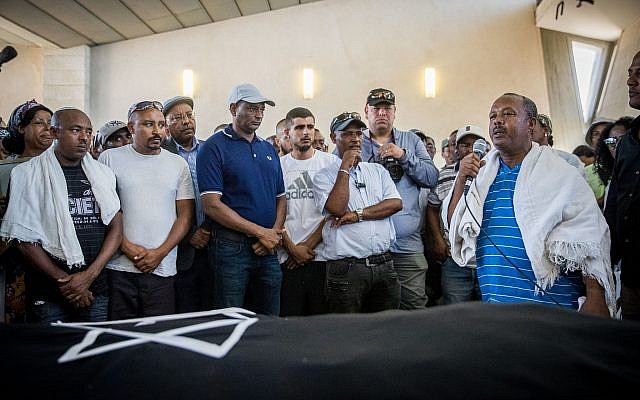
“Give me back my son,” Tekah’s father Worka cried as he entered the funeral home in the Kiryat Haim neighborhood of the northern city. “My son had a joy for life and love of life. He smiled and he was sensitive.”
Worka Tekah used his eulogy as a plea for justice and cry for hope that the situation would change.
“We are asking for justice. My son has already gone but I hope he will be the last victim. Do not cry for my son. We demand that the murderer get what he deserves and find justice. Help me in this struggle,” he said.
More than 135,000 Jews of Ethiopian descent live in Israel. Those who immigrated arrived in two main waves, in 1984 and 1991, but many have struggled to integrate into Israeli society.
Community leaders and others have said there is a pattern of racism and abuse by police toward Ethiopian-Israelis, despite repeated promises to root out the problem.
As reported by The Times of Israel
